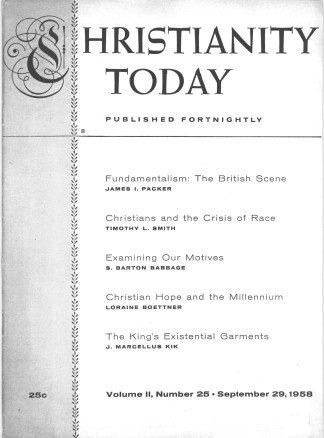The publication of Alan Walker’s book on evangelism, The Whole Gospel for the Whole World, has focused attention on the content of the Gospel. Dr. W. E. Sangster describes it as “an outspoken challenge to current evangelistic message and method.” Alan Walker led the Methodist campaign in Australia known as “The Mission to the Nation.” More recently, he has given addresses throughout America. Now he has returned to become superintendent of the Central Methodist Mission in Sydney.
Mr. Walker is an impassioned speaker with unusual gifts of oratory. He began his ministry among the miners of New South Wales, and later published a volume, entitled: Coal-town—A Sociological Survey of Cessnock, N.S.W. It marked the beginning of his deep involvement in social problems. Since that time he has spoken in season and out of season on the social implications of the Christian faith—particularly on such issues as peace and war, security and the welfare State, gambling and drink.
These themes are prominent in this new publication. In the introduction E. G. Homrighausen writes: “Alan Walker’s name is increasingly associated with that ‘larger evangelism’ which is needed in our time.… He rightly maintains that nineteenth century evangelism is not enough for the twentieth century.” Alan Walker does not hesitate to enumerate what he calls “the serious limitations and weaknesses which belong to nineteenth century evangelism.” “They are: a message which stops short of being the whole gospel for the whole world; an intellectual presentation of the faith which denies or ignores the great gains of biblical scholarship of the last one hundred years; a personal evangelism which has no social dynamic; an inadequate relationship with the Church as the body of Christ; an exaggerated trust in mass meetings as such and a calling for commitment to Christ in an emotional atmosphere with a limited intellectual and specific content.”
We are all familiar with Dean Inge’s quip: “Any stigma is good enough to beat a dogma.” If we ask “what is the kind of message which God seems to use in this twentieth century for bringing men and women to commitment?” (p. 99), the answer is “an evangelism which is … relevant to real-life situations.” This is the burden of his preaching. “To many it is destructive of faith that the Christian Church so often fails to be in the forefront of the reformist movements in history.” He passionately and stridently proclaims that the Church must give a social witness. Only so can modern man hear the Gospel.
Alan Walker is urgently insistent that the evangelization of the twentieth century man is dependent upon the social and political involvement of the Church.
All this involves a number of fundamental fallacies. It is imperative that we should make a clear distinction between the Gospel itself (with its message of repentance and forgiveness) and the application of the faith in personal and social life. William Temple made an important point when he said: “Social witness is both a preparation for evangelism and a consequence of it.” It is unfortunate that Alan Walker (despite his great gifts) is unable to understand this.
Again, there is, behind this interpretation of evangelism, a regrettable failure to understand the nature of the Church. The Church is more than the accredited officers of the Church making pontifical ecclesiastical pronouncements. The Church is the fellowship of the redeemed, clerical and lay. The world will not be redeemed by the leaders of the Church making ex cathedra statements on social and political problems—for the leaders of the Church are neither infallible nor impeccable; but rather by each member of the Church giving his own personal witness in his own local situation. It is the worship and witness of each member of the Church that is truly converting.
Finally, there is an unhappy disregard for the work of the Holy Spirit as the divine Agent of evangelism. “Unless the Lord build the house, they labour in vain that build it.” “Without Me,” Jesus said, “ye can do nothing.” How often we forget these facts! The Holy Spirit can alone convict men of sin; he alone can bring to men a realization of their need. As we condemn “the serious limitations and weaknesses” of mass evangelism we need to remember that it is still the good pleasure of God to save by the foolishness of preaching them that believe.
These are serious strictures. Nevertheless there is much to be gained from a consideration of Alan Walker’s conclusions concerning the planning and conduct of evangelistic crusades. He says that evangelistic meetings ought to be held on “neutral territory.”
We have made a significant discovery in Australia. From one end of the land to the other we have found that whenever Mission to the Nation meetings have been held in public halls or theatres or auditoriums audiences were two or three times larger than if meetings were planned in church buildings. This evidence has come to us so consistently that we now refuse to plan evangelism in anything but neutral territory—that is, when we are concerned with the true outreach of the Church to the people beyond its life. So startling has been this discovery that it has caused us to seek the psychology that lies behind it. Why should people be ready to come to public halls and shrink from entering churches? The chief reason is that most people dislike above all else to be called hypocrites. They have the mistaken idea that to be seen entering a church building is to be making a certain Christian profession. As yet they are not willing to declare themselves Christian in case their associates, knowing their lives, regard them as insincere and inconsistent. Therefore, they stay away. Also to enter a church is to be plunged into the style of worship that goes on in that church and there is fear of personal embarrassment through ignorance of procedures. So, rather than be noticed standing or sitting at the wrong time or fumbling in ignorance a hymn or prayer book others know so well, they stay away. Perhaps it is the very situation that Jesus found, and which led him to speak in the open rather than in synagogues. Perhaps the same discovery caused John Wesley to go out of the churches in his day to where the people were. Perhaps then, too, if men were to be won to the Church, they had first to be met and reasoned with outside the Church. Certainly it is logical to say it is a waste of time to preach in church trying to reach people who do not go to church.
This is an arresting comment and the conclusion is challenging. These observations are worthy of serious reflection.










